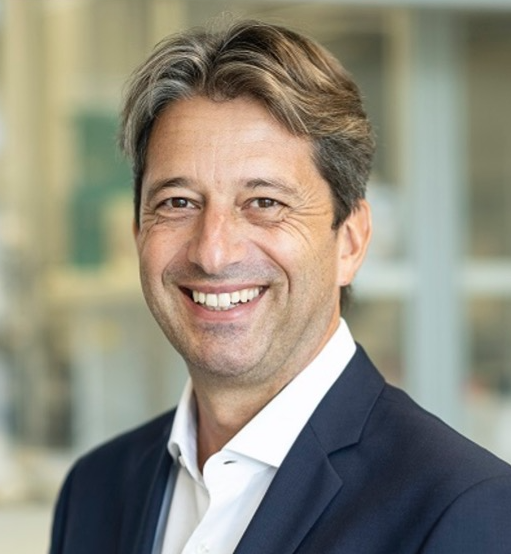Meet Gisbert Schneider who becomes faculty member at D-BSSE
As of 1 June, ETH-professor and Biochemist/Bioinformatician Gisbert Schneider, is affiliated with D-BSSE. Heading the Computer-Assisted Drug Design group, also some of his lab members moved from the Institute of Pharmaceutical Sciences at D-CHAB to Basel. Gisbert’s research activities focus on the development and application of adaptive intelligent systems for molecular design and drug discovery. A warm welcome, Gisbert!
You are heading the lab on Computer-Assisted Drug Design lab. What exactly is your field of research and which tools do you use?
In short, we are using AI for drug discovery and design. Our molecular design laboratory (MODLAB) consists of researchers from diverse scientific backgrounds. We conduct interdisciplinary studies to adapt and develop machine learning methods for various aspects of medicinal and bioorganic chemistry. Our primary focus is on the "de novo" design of innovative drug-like molecules, typically small organic molecules or peptides, which we then synthesize and test in suitable biochemical or biological assays, often in collaboration with partners from industry or academic institutions. Additionally, we explore the applicability of modern AI approaches to predicting the biological activity of small molecules and optimizing their chemical properties towards preclinical endpoints.
Between 1994 and 1997 you held various postdoc positions in academia and then moved into industry, working as a scientist in the Pharmaceuticals Division of Roche. How do you describe this experience, and in what way did it lay the ground for your next career steps?
I would not want to miss this firsthand industry experience, which I enjoyed very much. During this time, I learned to prioritize my work and focus on clear deliverables and applicable research outcomes. After several years in the pharmaceutical industry, I decided to continue my career in academia to have greater opportunities to explore research off the beaten track, such as AI-driven drug design. The application-oriented mindset from the industry also drives my academic research. A question I frequently pose to my students and coworkers is, "Why do you do what you do?" I advocate for open-door collaborations between academia and industry because, as partners, we complement each other: basic research meets application. This is where I thrive.
Since 2010 you have been an ETH full professor, affiliated with the Department of Chemistry and Applied Biosciences (D-CHAB). What motivated you to change to the D-BSSE?
As a scientific community, we have learned that a medicinal drug rarely ever exerts its biological activity by selectively interacting with a single macromolecular target. Drug action is governed by nonlinear and multifaceted processes, and our understanding of human molecular pathology remains imperfect. Consequently, drug design is a challenging multi-dimensional optimization task. I hope to learn more about biological systems and how to interefere with them from my colleagues at the D-BSSE and continue our studies there. Meanwhile, I will still run a small chemical synthesis lab at the D-CHAB in Zurich. As a member of both departments, I have the unique opportunity to merge the best of two worlds, specifically aiming to develop a more biosystems-oriented view of medicinal chemistry. I also hope that our research helps bridge-building between the two ETH sites.
During the past three years you also acted as Director of the Singapore-ETH Center. What made you take this step, did you conduct research with regional partners there?
My first interaction with the Singapore-ETH Centre was during my tenure as Associate VP for ETH Global, when I learned about its research programs and mission. I was immediately captivated by its internationality, interdisciplinarity, and outcome-oriented approach. When I had the opportunity to lead the centre as its director, I did not hesitate for a second. The centre boasts a very strong research network. During the COVID pandemic, balancing my role as the centre’s director with numerous administrative duties made it challenging to attract new local collaboration partners in my own field of research. However, we are now in the process of setting up a joint initiative in AI-driven drug discovery in Singapore, which will provide opportunities for me to return there from time to time. I highly recommend visiting the Singapore-ETH Centre to anyone interested. It is situated in one of the most dynamic research environments globally, within a magnificent modern Asian city.
What are your plans for Basel now?
The very first step will be to start operations in Basel, get to know everyone at BSS and learn more about the ongoing research projects. We already feel warmly welcomed. My group will be small but, I hope, efficient. One of my ambitions is to establish new collaborations and foster existing ones, both within the department and with the vibrant pharma and biotech environment. Establishing an international drug design hub at the D-BSSE, together with selected partners and sponsors, would be a dream come true.

Gisbert Schneider is a full professor of Computer-Assisted Drug Design at ETH Zurich, where he spearheads research into integrating artificial intelligence and machine-learning methods into contemporary drug discovery. His career spans from the Pharmaceuticals Division at Roche to academia, initially at Goethe University in Frankfurt before assuming his current position at ETH Zurich. From 2021 to 2023, he served as the Director of the Singapore-ETH Centre at the CREATE campus. Gisbert is esteemed as an elected Fellow of the University of Tokyo. He is credited with introducing the concept of AI-based drug design to medicinal chemistry and is renowned for coining the term "scaffold hopping". His extensive body of work includes over 450 scientific papers. Additionally, he has co-founded several startup companies and serves as a consultant to the chemical and life science industry. Gisbert’s contributions to medicinal chemistry have garnered widespread acclaim, evidenced by numerous prestigious awards, including the Ernst Schering Prize, Herman Skolnik Award, and the Gmelin-Beilstein Medal.
Find more information about the Computer-Assisted Drug Design group led by Gisbert Schneider.